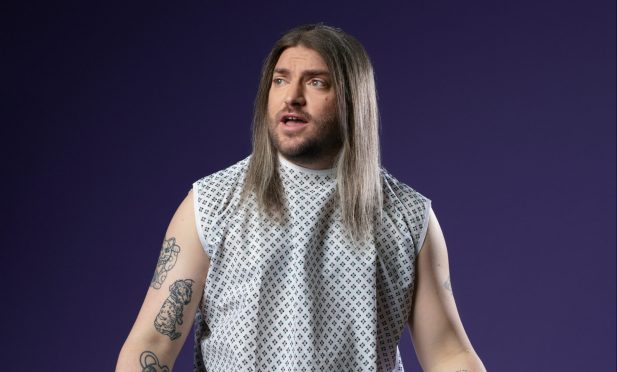
As the new year approaches, comedian Liam Withnail is gearing up for his first-ever UK tour, taking his critically-acclaimed show from the summer’s Edinburgh Fringe around the country.
Chronic Boom not only sent audiences home thoroughly entertained by an hour packed with laughs, but also with a new understanding of what it’s like living with a long-term health condition.
Edinburgh-based Liam was diagnosed in 2022 with ulcerative colitis, an inflammatory bowel disease that can cause recurring diarrhoea, stomach pains and significantly impacts on the lives of those who have it.
By talking about it openly and taking on the difficult task of making it funny as well, Liam hopes to make conversations around such conditions easier for those who may be suffering in silence.
Liam’s diagnosis
The journey to his diagnosis began when the 34-year-old fainted after completing the London Marathon in 2021.
“It was typical bloke – let things develop and fester rather than go and do anything about it,” he admitted.
“I probably had stomach issues for a long time. I think a lot of people do this, just assume it’s irritable bowel syndrome and they can’t really do anything about.
“It progressively got worse and because it was so incremental, I didn’t really pick up on it as much. It’s so slow that you don’t really notice it but I probably did know enough that I should have gone to a doctor.
“I think I was worried that a doctor would say well, you probably need to give up cheese or something and life wouldn’t be worth living! I just let it develop until it was completely unmanageable.”
It turned out Liam was experiencing a flare-up around the time of the marathon and was very anaemic, meaning his body wasn’t producing enough oxygen in the blood to be able to do respiratory exercise.
“Running a marathon under those conditions is incredibly dangerous and one of the reasons why it’s so important to go and speak to a doctor if you are feeling like things aren’t working properly,” he said.
“I finished the marathon but then fainted in a restaurant afterwards. Even then I thought, ‘of course I’ve fainted, I’ve run a marathon’, so it still took a few weeks.
“Then I experienced stomach cramps for the first time, really overwhelming pain on the floor of my living room. I finally went to the doctor.”
Six months of blood tests, stool samples, toilet diaries and finally a colonoscopy followed.
“Within a couple of seconds of the doctor looking at the screen he said, ‘yeah, it’s ulcerative colitis’,” Liam said.
“It took a long time to get from first symptoms to actual diagnosis. And, even post-diagnosis, it was still another six months until I ended up in hospital. Trying different medications, finding ones that work. It’s still an ongoing thing, to be honest.”
Condition’s impact
More than 50,000 people in Scotland live with ulcerative colitis or Crohn’s, another inflammatory bowel disease.
Many, like Liam, take too long to be diagnosed. According to Crohn’s & Colitis UK, for one in four, it is more than a year, and nearly half of them end up in A&E in the meantime.
Two particularly bad flare-ups caused Liam to be admitted to hospital for weeks under close monitoring.
Doctors performed a blood test each day to see how inflamed his organs were, with a normal reading sitting at five. At his worst, Liam scored 84.
It got to a point where bowel surgery and life with a colostomy bag was a possibility.
Eventually, though, the medication proved to be working and Liam was able to avoid an operation. His life was still, however, changed forever.
As a self-employed comedian, the risk of flare-ups and hospital stays all come at a cost.
Alongside the medication, he has had to adapt his diet and has obtained a Radar key, which gives him access to public disabled toilets.
“I’d had gigs booked in Dublin, Dubai, a few other places. I had to cancel all of them immediately as I couldn’t risk travelling in case I had a flare-up,” he recalled.
“For the few months after leaving hospital it was much more extreme than that. I was looking at gigs in Manchester and not taking the risk. That was something that improved over time.
“I’m at a stage now where I’m back to generally being able to tour and go out, but it could, at any moment, for reasons unknown, come crumbling down. That’s the kind of anxiety you carry in your back pocket at all times with a chronic illness, even if it has been a long time without a flare up.”
Fringe show
Weighing heavily on Liam’s mind in the aftermath of the hospital stay was if he could do the looming Fringe, and whether or not the ordeal could be mined for material.
He’d previously tackled tough topics before in his stand-up, including shows on recovering from alcoholism, but this time seemed more of a struggle.
“Comedians, we’re kind of poisoned, in that everything that happens in your life, you think could be a Fringe show,” he said. “This one was the most difficult to imagine as an hour of stand-up because it really was not funny at the time.
“It was a really traumatic period for me and my family going in and out of hospital, coming very close to undergoing surgery and also just adjusting to living with a condition that can turn your life upside-down at any moment.
“I found it really hard to imagine turning it into a show just thematically, but also in terms of being able to prepare a show under the circumstances of a constantly flaring chronic illness.
“I really didn’t want to not do the Fringe, but that was a big possibility.”
The solution was to break down the show into a number of different parts that could be worked on individually in short slots at comedy clubs, rather than relying on full preview shows before the festival that might have to be postponed at short notice. Each segment then fits together to form one cohesive story.
“It was always important to me to be very transparent and have it baked into the show. There was no point disguising that because the show really is about how you adapt and I was able to show my working there.”
The show was one of the hottest tickets of the Fringe, earning five-star reviews and selling out most nights.
“It meant that all 26 days in a row felt like a cup final,” Liam admits. “I wanted to make sure I got everything right.
“Ultimately, it was such a good experience and the reaction was really overwhelming at times.
“I met people who have had similar experiences, or have stoma bags, and even the nurses who looked after me in hospital came down. Those are the things that will stay with me the most.”
Laughing and learning
Liam Withnail hopes that people take plenty away from his show Chronic Boom, which tells the story of one of his hospital stays during an ulcerative colitis flare-up.
“People are just out there living their lives with serious, sometimes debilitating, chronic illnesses and disabilities,” he said.
“They are just getting by. I wish it could be much easier and in some cases it would be nice if people can realise that we’re out here just making life work the best way that we can and we know how.
“Another big take-away that I found is I speak in the show about going to visit people when they’re in hospital.
“I think when you know someone who’s in hospital, unless you’ve spent any real time there, you don’t really know what to say or what to do.
“There’s no real blueprint of behaviour. I find a lot of people in that situation just don’t do anything, freeze up.
“I’ve had quite a lot of people say to me since seeing the show that a friend was in hospital and they now know just to go and visit them, whereas before they wouldn’t have.
“That’s really remarkable to me because, when you’re in hospital, you really notice the people that come and make the effort.”
He added: “It is one thing to do a really smart show with all of the stuff that industry people like, but it’s important for me for anyone to be able to come out maybe thinking about something a bit differently, or maybe having learned something but having laughed the whole time.
“I did a preview in Brighton, where my parents live, and my dad brought some of his mates from the pub, these sort of big burly blokes and one of them is a butcher in his 50s and he came to the show and I spoke to him after and he said he’d never seen anything like that before and thought it was brilliant.
“It’s a really useful avenue for exploring big topics to everyday regular people who aren’t necessarily big theatre or comedy goers.”
Scotland’s comedy scene
It was a great Fringe for the wider Scottish comedy circuit, with a host of acts selling out runs and getting wider notice.
Having lived in Edinburgh since he was a student, Liam is delighted to be part of a thriving scene.
“Particularly the last Fringe, I felt like it took a massive step up in terms of visibility and and industry credibility,” he said.
“There’s always been stars and breakthrough acts. Since I started, we’ve had the likes of Fern Brady, Larry Dean and Susie McCabe all kind of making that step up to national and international level, but particularly at the moment it feels like there’s so many different acts doing things in their own way and getting that industry credibility.
“Be it myself and Christopher Macarthur-Boyd having a good time with solo shows and our podcast, the Some Laugh podcast boys (Marc Jennings, Stephen Buchanan and Stuart McPherson), Amy Matthews and Marjolein Robertson. There’s so many.
“Ten years ago, when I started, it really felt like London was where comedy really happened and as much as you can try, only one or two are going to get that industry look-in and even then it might be because they’ve moved to London.
“Whereas now you get someone like Krystal Evans doing again, a real sort of Fringe-y, brilliant show, that’s able to live in Edinburgh and still get all the kudos and people coming.
“There’s that book Meet Me In The Bathroom, the biography of the New York music scene in the early noughties with The Strokes, LCD Soundsystem etc and it’s a really exciting time where all these bands were able to flourish,
“I feel like Scottish comedy is in that kind of of moment. I’m just so excited for where it’s going to be in in five years time.”
Liam Withnail: Chronic Boom, March 29 at The Stand, Glasgow, April 13 at Perth Theatre, April 14 at Aberdeen Lemon Tree, April 20 at Monkey Barrel, Edinburgh and various dates across the UK. Tickets at linktr.ee/Liamwithnail

Enjoy the convenience of having The Sunday Post delivered as a digital ePaper straight to your smartphone, tablet or computer.
Subscribe for only £5.49 a month and enjoy all the benefits of the printed paper as a digital replica.
Subscribe © Rebecca Need-Menear
© Rebecca Need-Menear